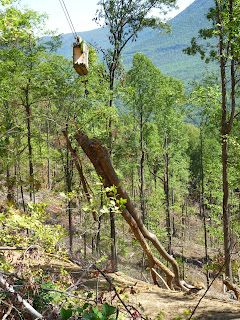Glenn normally works alone, utilizing a conventional timber harvesting method. But,...
Yesterday, I had the opportunity to watch Glenn, working for another logger, employing the 'cable' method. Spending five+ hours in the Jefferson National Forest on a glorious autumn day was a bonus - the sun was shining and warm; the foliage was starting to change to its fall display of brilliant reds, yellows, oranges; the surroundings were relaxing. It was like a 'homecoming' for me since I was a forester during the early, post-college time of my life.
Cable logging is used on steeply-sloped forested areas to minimize soil disturbance. Trees are cut, choked (attached) to the mainline, and lifted up to the log landing via a carriage moving along an overhead cable (skyline) that runs from the yarder to a firm anchor tree at the bottom of the slope. At the landing, the trees are cut to log size; loaded on to trucks; and are driven to the sawmill where they are processed into lumber. The bark and sawdust are useful bi-products - mulch, fuel, animal bedding - nothing goes to waste.
Other than watching Ax Men on television, I had never seen a cable logging process up close and personal. The operation was fascinating to watch - a choreographed, well-practiced harvesting approach. It has to be - logging is definitely hard work, dangerous work, and serious work.
Think of all the loggers who have had an impact in your own home - building materials, furniture,...even toilet paper.
Now think of your life without all those products...not a pretty picture, is it?



No comments:
Post a Comment